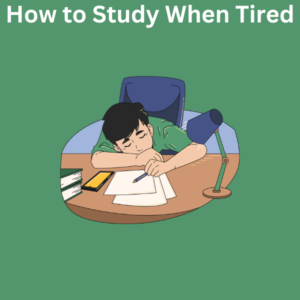Studying when you’re tired is a real challenge. After a long day or during the night, the struggle to stay focused can feel overwhelming. Whether you’re cramming for an exam or trying to finish assignments, it’s common to feel tired or low on energy during late-night study sessions. While fatigue might seem overwhelming, there are smart ways to manage it and maximize your study time.
In this article, we’ll explore effective strategies for how to study when tired. From boosting energy levels naturally to staying alert without relying on energy drinks, you’ll learn techniques to keep your brain functioning even during long hours of focused work.

Why Do You Feel Tired While Studying?
Feeling tired while studying can stem from various factors, including a disrupted circadian rhythm, insufficient sleep, or poor hydration. Long hours of sitting can also reduce blood flow, making you feel even more sluggish. Understanding these triggers is the first step to overcoming fatigue and maintaining productivity.
Effective Tips to Study When Tired
- Stay Hydrated
Drinking enough water is crucial for maintaining brain function and energy levels. Even mild dehydration can negatively affect one’s ability to concentrate and stay awake. - Take Short Breaks
Use the Pomodoro Technique: study for 25-30 minutes, then take a 5-minute break. Short breaks prevent burnout and help reset your focus. - Move Your Body
Simple exercises like jumping jacks or stretching can get your blood flowing, improving alertness and brain activity. Movement keeps you energized, even during a long study session. - Quick Power Naps
If you’re truly struggling, a 15-20 minute nap can work wonders. Short naps can recharge your brain without letting you fall asleep for hours. Just don’t nap too close to bedtime, as it may disrupt your internal clock. - Avoid Too Much Caffeine
While a cup of coffee can provide a quick boost, consuming too much may lead to increased anxiety, heart palpitations, and even disrupted sleep later. Opt for sustained energy solutions instead. - Stay Away from Energy Drinks
Though tempting, those drinks can cause a crash after the initial rush, leading to even lower energy levels. Avoid them and choose natural options like eating a healthy snack instead. - Eat for Energy
Snacking on foods like nuts, fruit, or yogurt provides sustained energy for focused work. Avoid sugary snacks, which can cause a quick energy spike followed by a crash. - Improve Your Study Environment
Open a window to let in fresh air, sit with good posture, and play some upbeat music to stay motivated. A well-lit, comfortable space can significantly boost your productivity. - Break Down Tasks into Smaller Chunks
Instead of tackling large sections, divide your workload into smaller parts. This makes studying feel more manageable and helps you stay focused longer. - Align Study Time with Your Body’s Clock
If possible, schedule study sessions when your body feels naturally alert. Avoid the early hours or times when your cortisol levels are low, as you’re more likely to feel tired during those periods.
Frequently Asked Questions (FAQs)
1. What should I do if I feel sleepy during a study session?
Take a short break to move around, drink water, or enjoy a quick power nap. These activities can help refresh your energy and keep you alert.
2. Are energy drinks helpful for staying awake while studying?
While they may offer a temporary boost, they can negatively affect your focus in the long run due to crashes and side effects. It’s better to rely on healthier alternatives like exercise or proper hydration.
3. Can I study effectively with low energy?
Yes! Focus on smaller chunks of work, use techniques like Pomodoro, and take regular breaks to maintain motivation and avoid burnout.
4. How does exercise help when studying?
Light exercises like jumping jacks or stretches improve blood flow, enhancing brain function and making it easier to concentrate.
5. Why is sleep important for studying?
Lack of sleep can impair brain activity, memory retention, and overall productivity. Aim to get enough sleep for consistent energy levels during study sessions.
6. What are some quick tips to boost energy without caffeine?
Drink water, get some fresh air, listen to upbeat music, or take a short nap. These natural methods can help you stay alert without relying on stimulants.
